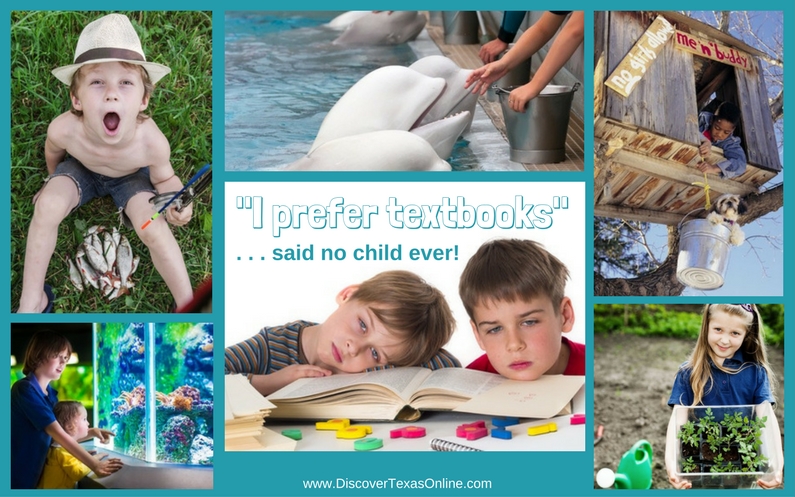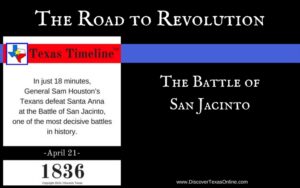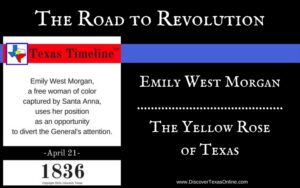 My Homeschool How-To for parents series explains why I arranged the Discover Texas History program as I did and how you can use the same approach to make your children’s other lessons meaningful, memorable, and fun. God and nature graciously provided object lessons all around us! As you’re planning your next year of learning, this might be a really good time to think through why unit studies (like the ones built into Discover Texas) work so well if your goal is to turn your children into lifetime learners.
My Homeschool How-To for parents series explains why I arranged the Discover Texas History program as I did and how you can use the same approach to make your children’s other lessons meaningful, memorable, and fun. God and nature graciously provided object lessons all around us! As you’re planning your next year of learning, this might be a really good time to think through why unit studies (like the ones built into Discover Texas) work so well if your goal is to turn your children into lifetime learners.
- Children get a chance to launch their own education
When I was little and used to complain that I was bored, my mother would wisely advise me to “find something to get interested in.” An unchallenged mind gets bored easily, a bored mind usually finds trouble, and a mind that finds nothing interesting and nothing to do will eventually lose interest in doing anything at all. That blank-eyed stare you sometimes see on faces focused on mindless television programs…it’s sad, isn’t it? Unit studies teach children to take interest in the world around them and sharpen their curiosity as they wonder how and why. This, by the way, is a higher level thinking skill. Unit studies actually teach your children how to make themselves think, and that’s one step toward becoming a lifelong learner!
- Children have the opportunity to focus on their natural interests
When people have the chance to learn more about something they’re already interested in, you don’t have to do much coaxing. Tired of begging your children to apply themselves to their schoolwork with a better attitude? Allow them the opportunity to delve deeply into topics they already find interesting!
- Children are given the responsibility to pursue their own education
You may need to get the ball rolling and lead the way to help your children learn how to learn–taking them to the library and on field trips, finding knowledgeable people they can talk to, helping them write letters requesting information, teaching them to safely conduct research on the internet, etc. Soon, though, they’ll begin to learn how to teach themselves and look for constructive opportunities to improve their knowledge. Those are skills that will add real value to their adult lives!
- Common experiences transcend age segregation
If you teach children of several ages and have ever wondered how to make time to work with each one, please note that unit studies solve that problem rather easily. I’ve compared this teaching method to singing a song with voice parts. Each one sings the notes they can reach, and the song is made even better because it all works together! When you work on a project or take a field trip, each person participates in a way that’s appropriate to their own abilities, but at the same time they’re exposed to what everyone else is doing. The subtle complexities of learning together make the experience better for everyone.
- Activities embrace all learning styles
This point is similar to the last one. Just as each person participates in a way that’s appropriate to their own age and abilities, each student will gravitate to the portions of the activity that fit their learning style. On the same walk through the woods, a visual learner may be reading each informational sign and making sketches while the auditory learner is asking the park ranger questions and pointing out all the different sounds the woodland creatures make. Meanwhile the tactile learner is filling his or her pockets with rocks, acorns, and interesting leaves and flowers. If you build in a time for each to share what they’ve learned, you’ll be amazed at how the whole group benefits from the shared perspectives!
- Valued content is learned in context
“Why do I have to do this? When will I ever need to know this?” A common complaint, but one that doesn’t happen often when you learn with unit studies because they’re already using the various skills in context of what they’re trying to learn and accomplish. For example, when our daughter wanted to learn about Halley’s Comet, our daughter learned to write and proofread a letter of introduction because she wanted to ask a local astronomer the difference between a comet and an asteroid. She learned about scientific notation, a mathematical skills involving place values, in order to understand how close the comet’s path came to Earth compared to the orbits of the moon and other planets and the far-away stars. She learned about the history of the Norman Conquest because the wife of the winning noble, William the Conqueror, embroidered a lovely tapestry of the battle . . . including her depiction of Halley’s Comet, which was considered a victory omen. She eagerly learned a bit of world geography, too, when we researched the location of that tapestry in Bayeux on the Normandy coast of France.
- The rewards of scholarship are built in
Learning really is its own reward! In the process of their education, our children got to go to so many interesting places and participate in so many meaningful activities. They got to meet fascinating people and get a jump on developing unusual skills and talents that their traditionally schooled peers didn’t have time to pursue.
- We learn best from our own experiences
Benjamin Franklin said, “Tell me, and I forget. Teach me, and I remember. Involve me, and I learn.” It’s true, isn’t it? Have you even thought that you’ve learned ten times as much from life after school than you ever learned from sitting at a little brown desk? Part of that is because textbooks tell us about what someone else experienced. It’s knowledge in theory . . . but unit studies let children learn from their own experiences and from real life.
In the coming posts I’ll write more about these topics, and we can develop the thoughts together. (At least I hope we’ll do it together. Please feel free to add your comments!) In the meantime, as traditional schools start up across the country, remember that it’s common for homeschool parents to wonder if their kids are “missing something.” That may be . . . but maybe our question should be, “What are they experiencing that’s even better?!” 🙂



